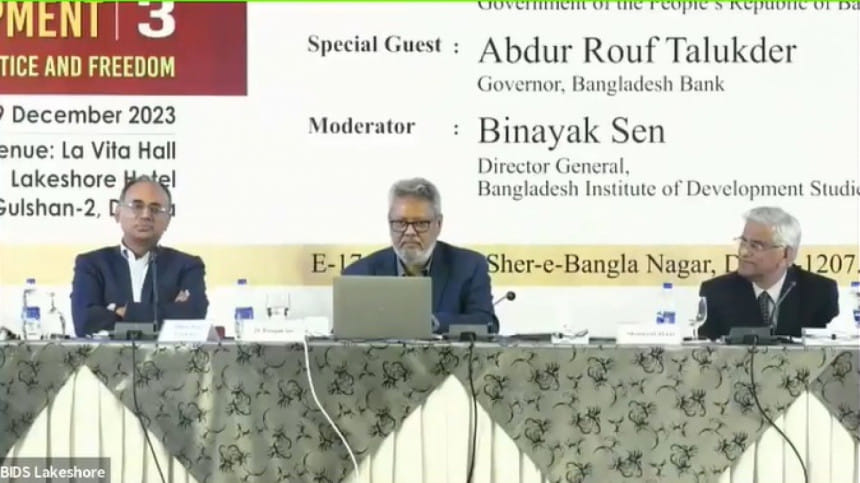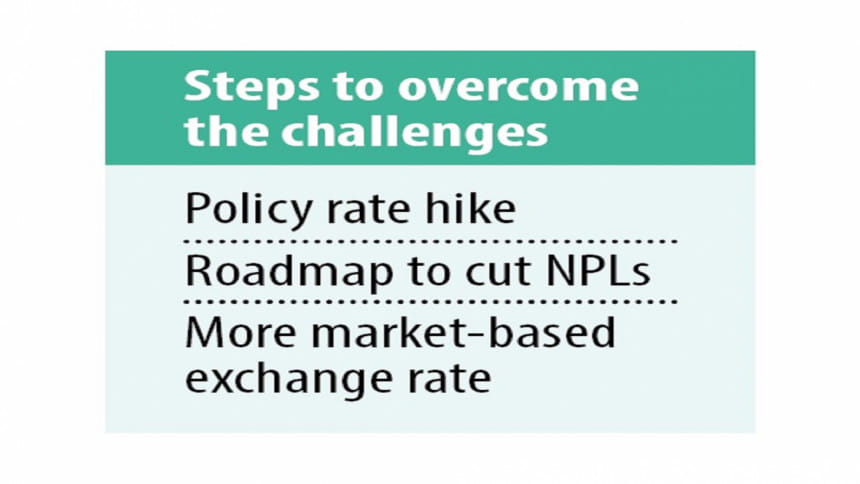No chance for a fully floating exchange rate: governor

The central bank governor today ruled out the possibility for a floating exchange rate although many economists have long suggested Bangladesh put in place a market-determined price to tide over the current economic volatility.
"There is no possibility of launching a floating exchange rate," he said, adding that most of the economists the Bangladesh Bank has talked to have suggested not to go for a freely floating exchange rate.
"It will be more market-based that will allow ups and downs within a band so that the exchange rate remains closer to the real exchange rate."
The governor also said the central bank has framed a roadmap to reduce non-performing loans (NPLs) and it will be implemented soon.

He made these comments during a session titled "Policy Challenges in the Context of Global and Domestic Uncertainty" on the concluding day of the three-day "Annual BIDS Conference on Development" at the Lakeshore Hotel in Dhaka today.
An elevated level of inflation, exchange rate volatility and higher non-performing loans are three major challenges facing the economy, according to the governor.
Rouf Talukder said he has discussed the present economic situation with many eminent economists, which helped him identified the problems and find solutions to them.
In response to economists' call aimed at ensuring political commitments to solve these problems, the governor assured that the present government is playing a supportive role.
Ahsan H Mansur, executive director of the Policy Research Institute (PRI), described higher inflation and fixed exchange and interest rates as short-term challenges and lower revenue mobilisation as a medium-term problem.
The tax-to-GDP ratio is not adequate to transform Bangladesh into an upper-middle-income country, he said.
He said the financial sector is also being hurt in multiple ways whether it is the stock market, the bond market or the insurance market.
"All of the indicators are pointing that the financial sector is going down."

The economist said after the election, political leaders should push ahead with the reform programme.
"If they think that the economy will be okay without doing anything, then it will collapse within two to three years."
Bangladesh is currently implementing a programme under the International Monetary Fund (IMF). Mansur, a former official of the lender, termed the programme a timely one.
"However, the country does not need money. Rather, it needs the policy reforms that the IMF has prescribed. So, the country should follow the reforms for its own interest."
The governor said rising agriculture production, the RMG sector and remittance drive the economy and they are on the right track.
"Farm and industrial production growth is good while remittance and RMG exports are on the rise."
He said there are some economic and non-economic factors for the higher inflation.
"The central bank has already raised the policy rates, so funds worth Tk 700 crore to Tk 800 crore are returning to Bangladesh Bank's vault every day."
"Its impact has been seen when it comes to inflation, which has started to decline."
According to the governor, inflation may fall to 8 percent in December.
"It will hopefully drop to 6 percent point-to-point basis by the end of June."
Rouf Talukder said the budget deficit is low, the debt to GDP ratio is low and the foreign debt to GDP ratio is also lower than the threshold prescribed.
"The current account deficit has turned surplus. However, the problems remain in the financial account mainly due to the drying up of foreign direct investments and short-term borrowing from abroad."
"The central bank is trying to resolve them."
He said the central bank is now seeing a strong political commitment to reform the financial sector.
"As a result, bank and financial institutions related acts have been amended while habitual default loans were defined which will be helpful in reducing NPLs."
Zaidi Sattar, chairman of the PRI, said the country has more than 1,609 non-RMG exporting products, so the government should put in place supportive policies for them.
"If it continues the protection years after years without any targets, local industries will not be competitive and export diversification will be on paper alone."
Selim Raihan, executive director of the South Asian Network on Economic Modeling, said no endeavour was seen in reducing the NPLs, so it is hurting the sector badly.
"The legal system is also not conducive to curbing the NPLs. We want to see a strong political will and a roadmap to bring it down."
Tapan Kanti Ghosh, senior commerce secretary, said the government can't allow the import of all products to promote local industries.
He said whenever there is a shortage of goods, hoarders try to make quick bucks.
Mashiur Rahman, former economic affairs adviser to the prime minister, Rasheda K Chowdhury, a former adviser to a caretaker government, Prof Mahbub Ullah, a former chairman of the development studies department at the Dhaka University, Ainun Nishat, emeritus professor at the Center of Climate Change and Environmental Research at BRAC University, Zafar Sobhan, editor of the Dhaka Tribune, Habibur Rahman, chief economist of the BB, and Sharifa Khan, secretary of the Economic Relations Division, also spoke.

 For all latest news, follow The Daily Star's Google News channel.
For all latest news, follow The Daily Star's Google News channel. 



Comments